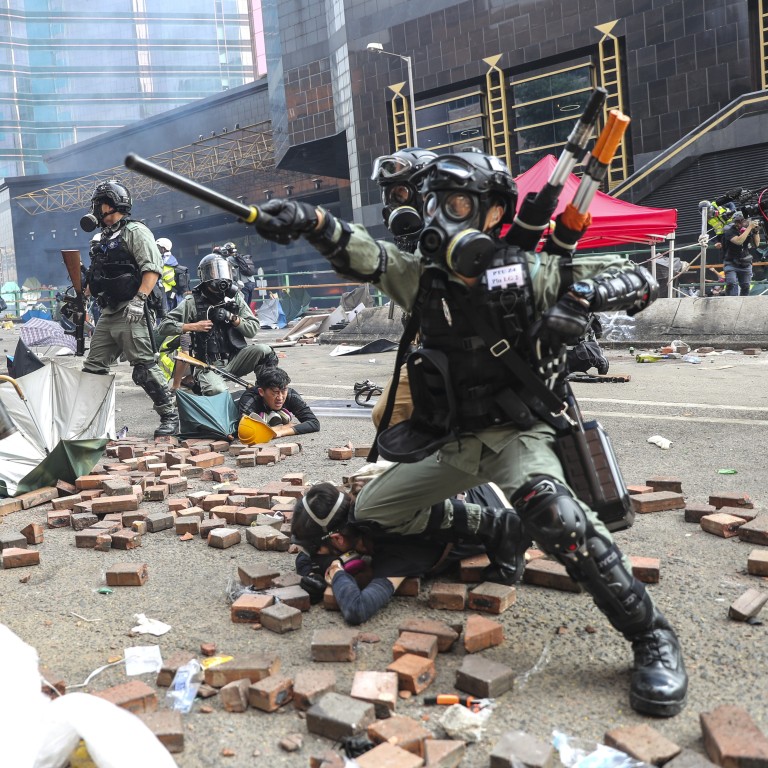
Hong Kong protests: ‘unfair’ to burden Independent Police Complaints Council with unrest probe without powers, its former chief says
- Jat Sew-tong breaks silence to say police watchdog he used to chair lacks powers to properly investigate the anti-government unrest
- Judge-led inquiry would have been the best option, says Jat as he accuses government of missing opportunities
The former chairman of Hong Kong’s police watchdog has said it was unfair to burden it with investigating the city’s anti-government protests when it was not designed for the job.
Senior Counsel Jat Sew-tong, who led the Independent Police Complaints Council (IPCC) from 2008 to 2014, said the outcome of the probe would fail to satisfy both the public and the government, as he publicly backed a judge-led inquiry for the first time.
“Trying to transpose [the IPCC’s role] to an investigatory one, or something of that nature, it’s really putting a square peg in a round hole, in my view,” Jat said at a forum held at the University of Hong Kong.

The first interim report from the IPCC was originally due to be published in February, but was delayed due to a legal challenge for which no date has been fixed.
But critics argue the watchdog has stalled over its release, while the body was berated for its lack of investigatory powers and the impact that could have on holding the force accountable.
Jat said the IPCC was unjustly criticised because the review landed the body in a “no-win position”, exposing it to attacks over its credibility.
“If I were the chairman, the first question I would ask is: ‘Why am I, the IPCC, being asked to undertake this job … when my secretariat, my resources, are not set up for that purpose? How am I going to discharge those duties to the satisfaction of the public?’” Jat said.
Hong Kong police watchdog ‘lacks power’ to probe force conduct during protests
“A lot of my former IPCC members have this sense that the IPCC has been used in this way, unfairly … Whatever the IPCC does will not satisfy the public or the government. It is a sad episode as an IPCC ex-chairman. The only good thing I can say is that I’m not in the chair.”
When Jat stepped down in 2014, he said the IPCC should be given more investigatory powers to probe serious cases, and urged his successor to start negotiating with the government.
The IPCC is an independent body established in 2009 under legislation to “observe, monitor and review” complaints against police.
Jat told the Post on Tuesday night he shared the same views back in 2014, saying the IPCC should be able to probe serious cases or those of great public concern.
“At least you should have somebody to oversee some of the issues. That sort of power is beneficial to society, particularly given the conflict,” he said.
He also made clear for the first time his support for a commission of inquiry, which would be presided over by a judge, into the unrest.
Hong Kong government ‘will consider’ commission of inquiry into police handling of protests
“The government has missed many, many opportunities, to be absolutely honest. This is not just my view, I think a lot of people share it,” he told the HKU forum.
“Objectively that’s a bit too late, but something has to be done, whatever it is.”
Jat expressed his disappointment at the government’s failure to take the lead and bring about meaningful dialogue.
“It has the obligation to proactively seek a solution for all, that’s what the government should do,” he said.
Stressing he was referring to all sides involved in the unrest, he said: “All acts of violence must stop and we must go back to normality in terms of peace, to enable rational dialogue to resolve the current crisis.”
Meanwhile, former IPCC member Lisa Lau Man-man, who has involved in drafting the first interim report before her term expired in the new year, expressed disappointment over the delay to its release.
Lau told a radio programme the report was needed to meet public expectations to at least clarify some facts and help in de-escalating the situation in the city.
She previously told a Chinese newspaper the IPCC had not been able to meet with police commanders over the Yuen Long MTR station mob attack on July 21. But Lau stressed she was not accusing the force of being uncooperative with the review, adding she appreciated the difficulty police had in handling the unrest.

